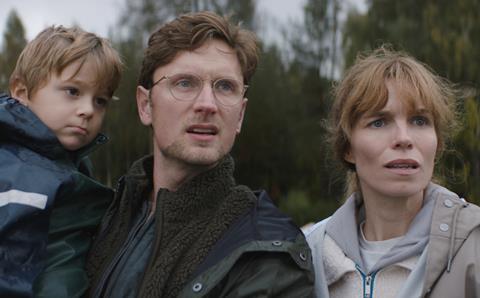A Danish couple find themselves – literally – while on a rural retreat in Sweden in this confident genre debut

Dir: Karoline Lyngbye. Denmark. 2023. 105mins
Reflection is everywhere in Superposition, most obviously in the repeated use of mirror imagery but also in the painful psychological reckoning of its unwitting protagonists. This accomplished feature debut from Danish short filmmaker Karoline Lyngbye may hang on the genre premise of a troubled couple encountering their doppelgängers, but it reveals itself to be a sharp, knowing commentary on real-world concerns of individuality, loyalty and trust.
A sharp, knowing commentary on real-world concerns of individuality, loyalty and trust
The Danish Film Institute-supported Superposition — so named after the quantum physics principle of two distinct but identical physical phenomenon combining as part of the same event — marks a confident move into features by Lyngbye, and arrives at Rotterdam after being presented at Cannes Marche du Film Frontiers Platform and DOK Leipzig’s Co-Pro market. The intriguing Twilight Zone-esque premise (which also calls to mind the likes of Us, Glass House and Vivarium) and striking aesthetic should help it ride the current wave of Scandi genre cinema to further festivals; September Film will release in Denmark and it could spark the interest of an international distributor looking for intelligent genre fare.
Thirtysomething married couple Stine (Marie Bach Hansen) and Teit (Mikel Boe Folsgaard), together with their young son Nemo (Milo Olsen), travel from their home in Copenhagen to the depths of the Swedish forest to embark on a year-long rural relocation aimed at bringing renewed peace and focus to their lives. This conceit of them ‘finding themselves’ may be somewhat unsubtle, given subsequent events, but their motivations feel genuine, if tinged with modern preoccupations. Teit will record the whole thing for a radio podcast, for example, while aspiring writer Stine plans to take advantage of the lack of distractions to finish her long-gestating first novel.
The family’s arrival at their new accommodation immediately sets the wry tone for this so-called retreat — this gleaming lakeside glass house, with its electricity, well-stocked kitchen and groaning wine rack, is less back to basics and more of a luxury home-from-home. Cinematographer Sine Vadstrup Brooker captures the family’s reflections as they approach the building’s huge windows, disappearing into themselves as they round the corner; a striking (if, again, rather obvious) visual and thematic motif that will be revisited throughout the film.
Despite the couple’s high hopes — Teit sends their podcast recordings back to the radio station marked with the project’s code-name ‘Paradise’ — it proves difficult to start anew. Stine worries that their podcast may sound ‘pretentious’, while Teit debates whether to edit their conversations lest their honesty be off-putting. Childcare, particularly, remains a familiar bone of contention, Nemo’s incessant demands meaning that neither can give their full attention to their creative projects. Invariably it’s Stine who makes the compromises, giving Nemo her iPhone to play with so she can concentrate on her writing.
Something darker lurks, too – the hint of a past trauma which still casts its shadow and hinders any real intimacy. Despite the beauty of the forest around them, which has a fairytale green lushness, the colour palette around the couple is muted, the house’s sharp lines and acres of cold glass emphasising the distance between them. The film’s first half is a slow-burn character study of a failing marriage, the tension already rising before Nemo disappears in the forest, only to return with the distressing accusation that Stine is not his mother. Spooked, they decide to return to Copenhagen.
Their efforts to escape lead them to an identical house, with an identical — and identically freaked out — Stine and Teit inside. Notably, there’s only one Nemo, and that fact alone leads the foursome (after some initial aggression) to attempt to find answers. Resulting conversations give Stine and Teit the unusual (and not entirely welcome) advantage of being able to appraise themselves, and their relationship, from the outside. It’s a credit to the nuanced performances by Hansen and Folsgaard, not to mention some clever in-camera work and sleight-of-hand editing by Jakob Jul Told, that these characters feel like four individual, complicated people with their own competing concerns.
While Freud would have a field day with some of these interactions — including a bizarre and not-entirely-convincing near-orgy — the screenplay, by Lyngbye and Mikkel Bak Sorensen, largely keeps its feet on the ground, mining the darker aspects of the human condition and bringing long-held animosities, fears and desires screaming into the light. Life’s true horrors, the film posits, come from within; a place from which there can never be any escape.
Production company: Beo Starling
International sales: TrustNordisk info@trustnordisk.com
Producers: Amalie Lyngbo Quist
Screenplay: Mikkel Bak Sorensen, Karolin Lyngbye
Cinematography: Sine Brooker
Production design: Silke Aune Dammen
Editing: Jakob Juul Toldam
Music: Pessi Levanto
Cast: Marie Bach Hansen, Mikkel Boe Folsgaard, Milo Olsen
























